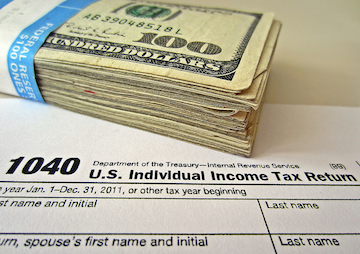Where the Presidential Candidates Stand on Their Tax Returns
Hillary Clinton and Jill Stein released their personal tax returns this week, putting pressure on rivals Gary Johnson and Donald Trump to release theirs. The increased attention on the nominees’ taxes comes during an election season focused heavily on economic inequality. (Flickr / CC 2.0)
The increased attention on the nominees’ taxes comes during an election season focused heavily on economic inequality. (Flickr / CC 2.0)
The increased attention on the nominees’ taxes comes during an election season focused heavily on economic inequality. (Flickr / CC 2.0)
Lately, a key focus of Election 2016 has been tax returns—namely, who has released them and who hasn’t. On Friday, Democratic presidential nominee Hillary Clinton released her 2015 return, which shows that she and her husband made more than $10 million. The Green Party’s Jill Stein released part of her tax return as well, although the two pages of form 1040 she provided stand in stark contrast to Clinton’s documents.
“The Clintons pulled in $10.6 million in 2015, much less than the nearly $28 million they made the year before,” reports Jeanne Sahadi of CNN Money. “Their tax return showed that they paid $3.24 million in federal income taxes.” The Clintons also deducted more than $1 million in charitable donations. Chuck Ross of The Daily Caller notes that 96 percent of this donation money went to the Clinton Family Foundation (a private nonprofit used by the Clintons to make charitable donations, not to be confused with the Clinton Foundation).
Peter J. Reilly of Forbes, meanwhile, analyzed Stein’s “unexciting” tax return. “I think it likely that the $302,258 in salary was all earned by her spouse Dr. Richard Rohrer,” Reilly writes. “Besides the salary there is $140 in taxable interest income, $21,730 in tax-exempt interest income, $35,505 in dividends. $2,000 in business income and $9,185 in capital gains.”
Libertarian standard-bearer Gary Johnson has yet to release his tax return. However, in a CNN interview on Friday, Johnson attempted to compare his financial situation with that of the Clintons. “My charitable contributions would be negligible—I mean just, really almost nonexistent,” he told CNN. “For me, giving to charity, I’ve always viewed that the things that I do in my life contribute to making lives better. That what I’ve done.”
Johnson added that he thinks his own effective tax rate is around 20 percent. The Clintons, according to CNN’s calculations, paid an effective tax rate of more than 30 percent. “By any measure, though, Hillary Clinton and her husband have satisfied the Buffett Rule that she’d like to impose if elected,” Sahadi writes. “Under that rule, anyone with adjusted gross income over $1 million would have to pay a minimum of 30% of their income in taxes.”
The release of the Clintons’ tax return has also put pressure on Republican nominee Donald Trump to do the same, especially since both candidates have focused on their tax proposals on the campaign trail over the past week. Trump says he will not release his tax return while he is being audited by the IRS.
Danielle Kurtzleben of NPR explains the difference between Clinton’s and Trump’s tax proposals:
Trump’s tax plan is where he hews much more closely to other Republicans’ ideas. In fact, he recently overhauled his initial tax plan (which has been removed from his website) in favor of a new plan with brackets that match those proposed by House Republicans. …
Altogether, Trump’s plan would slash revenues and thereby grow the deficit. …
Clinton’s plan, meanwhile, goes in the opposite direction: she relies heavily upon taxing the rich, a major way she pays for her other programs. Lower and middle-income people, meanwhile, would see their incomes change little—some with a slight decline—while the richest one percent would see their incomes fall by 5 percent or more. …
The Tax Policy Center has estimated that Clinton’s tax proposals would boost revenue by $1.1 trillion over a decade.
Jason Miller, a Trump campaign spokesman, mocked Clinton’s tax return, saying that she “has turned over the only records nobody wants to see from her—the American public wants to see the 33,000 emails she deleted to obstruct an FBI investigation.” Miller continued, “This document release is nothing more than an attempt at distraction and misdirection by an individual who created and then purged an illegal private email server.”
It’s not only the presidential candidates who are caught up in the tax return frenzy. Virginia Sen. Tim Kaine, Clinton’s running mate, released financial records covering 10 years. “Tim Kaine and his wife had an adjusted gross income of more than $300,000,” writes Andrew Rafferty of NBC, “and paid an effective federal tax rate of 20.3 percent last year.”
And new video footage shows Trump’s running mate, Indiana Gov. Mike Pence, adamantly ignoring questions from reporters about whether he plans to release his tax returns.
While it is not required for presidential candidates to release the tax information, it’s been common practice during election season since the 1970s. The increased attention on the nominees’ taxes comes during an election season focused heavily on economic inequality.
Your support matters…Independent journalism is under threat and overshadowed by heavily funded mainstream media.
You can help level the playing field. Become a member.
Your tax-deductible contribution keeps us digging beneath the headlines to give you thought-provoking, investigative reporting and analysis that unearths what's really happening- without compromise.
Give today to support our courageous, independent journalists.






You need to be a supporter to comment.
There are currently no responses to this article.
Be the first to respond.